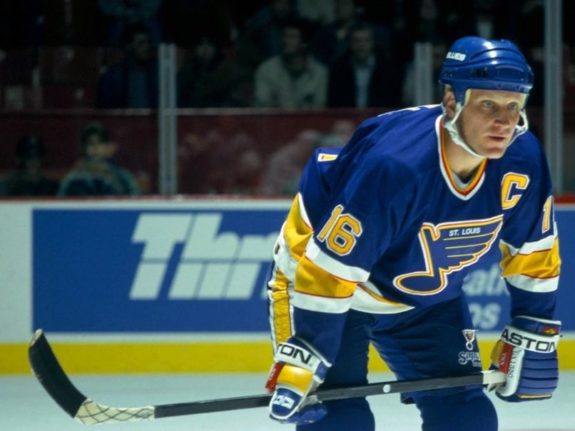Over the long and storied history of the NHL, some of the best playmakers have left their mark on the league. One of those players who left his mark as one of the league’s best playmakers is Adam Oates, who played for six different teams over 19 seasons.
During stops in his career, he played alongside some of the most gifted goal scorers the league has seen, and in some cases, they scored goals at impressive rates with Oates’ help. Undrafted out of college, Oates’ resume is about as impressive as we have seen.
Junior and College Hockey Career
Oates made a name for himself in the Ontario Provincial Junior A Hockey League (OPJAHL) with the Markham Waxers. In the 1980-81 season, he scored 36 goals and 53 assists in 43 games, but that was just the beginning for the right-handed shot. The following season, he scored 54 goals in 47 games with 105 assists, which earned him a spot on a college roster.
He played three seasons for Rensselaer Polytechnic Institute (RPI) in New York and put up impressive numbers for the Engineers. Each season, he increased both his goal total and assists. In his freshman season, he scored nine goals with 33 assists, but he was just getting started. His sophomore season saw his goals increase to 26 and assists jump to 57 before he scored 31 goals and dished out 60 assists as a junior in leading RPI to the NCAA championship (a 2-1 win over Providence College). He was a finalist for the Hobey Baker Award, given to the top collegiate player, but somehow did not walk away with the award.
Oates signed a contract with the Detroit Red Wings following his junior season, which began a 19-year career filled with plenty more ups than downs.
Hull and Oates
Oates began his career in Detroit, and by his fourth season with the Red Wings, it was clear what type of player he would be. In 69 games in the 1988-89 season, he averaged just under an assist-per-game with 62. What followed that season was one of the worst trades in franchise history, considering what happened the remainder of Oates career.
After 145 assists with the Red Wings and already becoming an elite passer, Oates was traded to the St. Louis Blues in June of 1989, where he joined Brett Hull on the top line, and the duo had an instant connection. How much of a connection? Consider the following: Hull averaged a goal per game with Oates, while in 195 career games in St. Louis, Oates averaged 1.17 assists-per-game for a total of 228. In 1,062 games without Oates, Hull scored 533 goals. Often referred to as the ‘Hull and Oates’ duo, they are one of the greatest duos of all time.

Oates, a five-time All-Star, had 58 goals to go along with his 228 assists in three seasons with the Blues, including two of his four seasons with over 100 points. During the 1990-91 season, he missed 19 games, but that did not stop him from putting up eye-popping numbers. In 61 games, he still registered 25 goals and whopping 90 assists, a big reason why Hull scored 86 goals that season on his way to winning the Hart Trophy. Oates was just starting to become one of the best and most gifted playmakers in the league.
Adam and Cam
Following the All-Star Game in 1992, Oates was traded to the Boston Bruins for center Craig Janney and defenseman Stephane Quintal. Oates felt underpaid by the Blues compared to the contracts his teammates had signed and he made it known by threatening a walkout, which forced the hand of St. Louis to make a trade. Once in Boston, he quickly jelled with one of that generation’s best power forwards, Cam Neely.

In his first full season in Boston in 1992-93, Oates put up career numbers with 97 assists and 45 goals for 142 points. He blew past Mark Messier of the New York Rangers and Mario Lemieux of the Pittsburgh Penguins, who each had 91 assists that season, to lead the league.
The following season, Neely scored 50 goals in the first 44 games, despite still being hampered by a knee injury sustained from a hit by Penguins defenseman Ulf Samuelsson in the 1991 Playoffs that limited him to just 162 games the remainder of his career. His goal-scoring outburst was largely thanks to Oates, who finished the season with 80 assists.
During his six seasons with the Black and Gold, Oates put up more points (499) than he did with any other team, as well as assists (357), goals (142), power-play goals (56), and game-winning goals (23). However, like his tenure in St. Louis, his time in Boston ended on bad terms.
New Start in Washington
After publicly calling out Bruins management about the direction they were taking the team, Oates was traded along with Rick Tocchet and goalie Bill Ranford, to the Washington Capitals, for Jason Allison, Anson Carter, goalie Jim Carey, and a draft pick.

Like Hull in St. Louis and Neely in Boston before him, Peter Bondra benefitted from Oates’ arrival in Washington. While his numbers were not as eye-popping as in the previous two seasons, Bondra still tied a career-high with 52 goals in 1997-98. How good was Oates? He is the only NHL center to play with three separate 50-goal scorers during his career. Whether it was Hull, Neely or Bondra, Oates was an unselfish player who made his teammates better and put his team first.
In his six seasons with the Capitals, Oates’ production dipped from his time in Boston with 290 assists and 73 goals, but in a time when league scoring was down, his 363 points were still good enough to rank near the top of the NHL. That season, Oates also earned his 1,000th career point.
At the 2002 trade deadline, Oates was dealt to the Philadelphia Flyers, but he was clearly on the backend of his career. He signed as a free agent with the then-Mighty Ducks of Anaheim following the 2002-03 season before finishing his career with the Edmonton Oilers, calling it a career following the final game of the season. Oates ranks 18th in career points with 1,420 and eighth all-time in assists with 1,079; he made his case to be considered one of the greatest passers in NHL history.

During the 1990s, Oates was as impressive a playmaker as any player in the league and that includes the great Wayne Gretzky. How much better was he than the Gretzky? During his decade of dominance, Oates had 753 assists, compared to Gretzky’s 740. Gretzky leads all NHL centers with 1,963 careers helpers and Oates is eighth on the list with 1,079. The Great One might have had 884 more career assists, but Oates was an exceptional playmaker in his own right.
In 163 career playoff games and 15 trips to the postseason, Oates had 42 goals and 114 assists. He twice recorded 20 points in the playoffs, in 1988 with the Red Wings and 1991 with the Blues. In the 1992 Playoffs with the Bruins, he had 14 assists in 15 games, and in 1993, he had nine assists in a four-game sweep by the Buffalo Sabres. Oates never won a Stanley Cup; his best shot was in the 1998 Playoffs when the Capitals were swept by the Red Wings in the Final.
Post-Playing Career
Following his career, Oates joined the coaching ranks. His first stop was with the Tampa Bay Lightning, where he was an assistant coach to his former teammate Rick Tocchet for the 2009-10 season. Following that campaign, he moved on to the New Jersey Devils for the 2010-11 and the 2011-12 seasons, when the Devils lost in the Stanley Cup Final to the Los Angeles Kings.

Following the Devil’s run, Oates was hired as the Capitals coach in June of 2012. Unfortunately, the 2012-13 season was delayed by a lockout over a labor dispute. In Jan. 2013, a new collective bargaining agreement (CBA) was signed, and the league played a 48-game schedule.
Oates led the Capitals to a Southeast Division title, but they were eliminated by the New York Rangers in seven games in the first round.
The following 2013-14 season, Washington missed the playoffs, despite winning 38 games, and Oates was fired. He did not stay unemployed for long; he was hired in Dec. 2014 to return to the Devils as co-head coach with Scott Stevens after Peter DeBoer was fired.
However, the season did not go well for the Devils, who finished 13th in the Eastern Conference and seventh in the Metropolitan Division to miss the playoffs for a third consecutive season after their 2012 Playoff run. Both Oates and Stevens were fired after the season.
In his tenure as a head coach, Oates had a 65-48-17 record in 130 games with the Capitals. One of the best playmakers in his time as an NHL player carried over his knowledge to his players and helped improve the power play of each team he coached.
Hall of Fame Career
On Nov. 12, 2012, Oates entered the NHL Hall of Fame, and why not? Over 19 seasons, he had 1,420 points in the regular season and 156 postseason points. Not only was Oates a gifted player, but he also had one of the great hockey minds that helped his teammates in his playing days and when he was behind the bench.
Are there better players than Oates? Yes, but whether it was with Hull, Neely, Bondra, or any other teammate, he always brought out the best in his linemates. He was voted one of the 100 Greatest Players in NHL History, and no matter who comes along, Oates will always be ranked as one of the best to ever play the game. To think, he got to play with natural goalscorers like Hull, Neely, and Bondra during his career. Not bad for an undrafted free agent out of RPI.

Scott Roche covers the Boston Bruins for The Hockey Writers. Scott has been a sports writer for 25 years for different sites and daily newspapers. Writing started out as a hobby, but it has become a passion for Scott over the years.